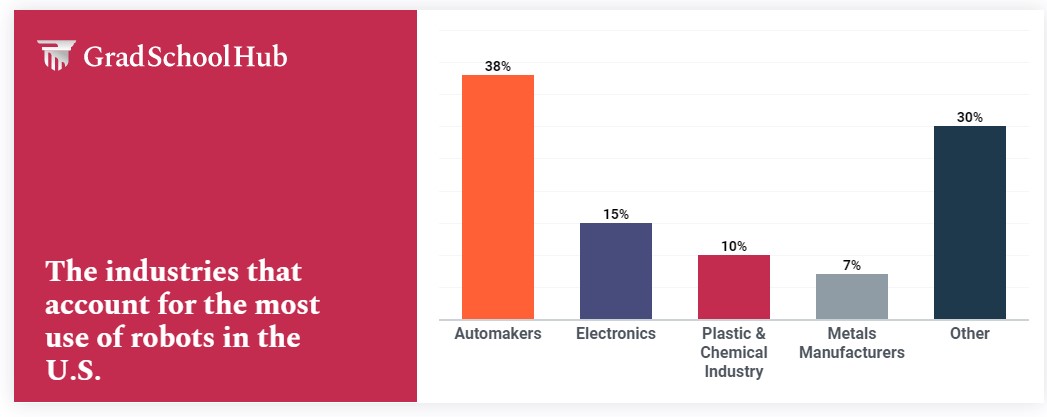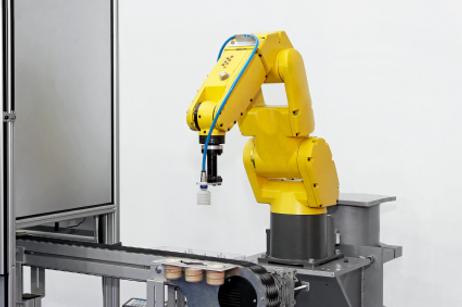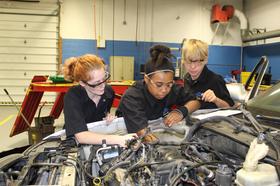Robotics is an exciting, dynamic field that utilizes robots in a variety of industries. Robots are used in manufacturing, transportation, warehouses, safety research, mass production, and even surgery. This field offers a wide range of employment opportunities to those who are qualified. How do you earn those qualifications? Your community college has programs in robotics to train you for a lucrative career in the industry.
Robotics is the design, repair, and maintenance of robots. A robotics engineer learns a blend of mechanical engineering, electrical engineering, and computer science principles to develop autonomous machines that perform a wide range of dull, dangerous, and complex tasks. Source: New England Institute of Technology
This video outlines careers in robotics.
About a Robotics Career
Best Accredited Colleges lists two common professions within the robotics industry:
- Robotics Technicians – These professionals typically require a two-year degree and are trained on the job in apprenticeship programs, as well as through classroom study.
- Robotics Engineers – These individuals earn a four-year degree, then usually go on to earn a graduate degree or professional certification in their field.
Both of these professions have a wide range of options within their chosen industry, including medical robots, air traffic management, and medical care. Industries in search of professionals with training in robotics include the auto industry, agriculture, and health care. Manufacturing is another area that uses robotics in a number of ways. Because the robotics field is wide open, there are plenty of good job opportunities for those interested in this profession.

Ivy Tech Community College recently introduced its Motoman Robotics Instructor Training (MERIT) Center for students interested in pursuing a career in this field. According to Robotics Online, the Ivy Tech campus will begin offering the DX100 Basic Programming course, with possible expansion to other courses and campuses.
Doug Schenher, vice president of Motoman Robotics, told Robotics Online, "We are very excited about collaborating with Ivy Tech and manufacturers in central Indiana. We view Ivy Tech as an extension of our Motoman training department. With an installed base of more than 1,000 robots in this area, this is a significant win for the regional workforce and manufacturers."
Thomas Snyder, president of Ivy Tech Community College is equally pleased with the collaboration. Snyder told Robotics Online, "Robotics is critical to Indiana's advanced manufacturing sector and as companies strive to increase efficiencies, the use of automated technologies will continue to grow."
This video outlines the Advanced Automation and Robotics Technology (AART) at Ivy Tech Community College.
Ivy Tech isn't the only two-year institution hopping onboard the robotics bandwagon. In Alabama, a new Robotics Technology Park is underway near the Calhoun Community College campus. According to a report at Alabama Live, the construction of the facility has piqued the interest of the Massachusetts Institute of Technology. MIT recently contacted the president of Calhoun, Marilyn Beck, to find out if the college would be interested in partnering with MIT to provide short-term training at the park.
The Robotics Technology Park is one of a kind and has garnered plenty of attention across the country. The purpose of the park is to meet the needs of business and industry, as well as train students for future careers in robotics. Beck said, "We're already having a great deal of excitement on the part of students about the robotics center. And they are telling our recruiters now that they are coming to Calhoun to take robotics programs. And it's not open yet."
This video gives an overview of the Robotics Technology Park.
In the Midwest, St. Louis Community College is also providing students with the opportunity to study in this expanding field. According to the college website, the Associate in Applied Science Degree in Robotics Technology is a 67-hour program that prepares students for careers in automation, robotics, and mechanics. This degree program qualifies graduates to work in industries like aerospace, automotive, petroleum, heavy equipment, and food processing. With so many career options to choose from, graduates from the St. Louis program have many opportunities waiting after graduation.
Students entering the robotics program should have:
- Basic math and analytical skills
- A mechanical aptitude
- An interest in computer applications
The course load is similar to an engineering program, although math is not as emphasized. Students also have the option to substitute six credit hours with relevant work experience.
Robotics is a growing field that employs individuals from a variety of backgrounds. A two-year degree in robotics from an accredited community college may be just the training you need to jumpstart your career. Check out the programs at one of the colleges listed above or contact a community college in your area to find out what types of robotics programs they have available.
Questions@ Contact us on Facebook. @communitycollegereview















